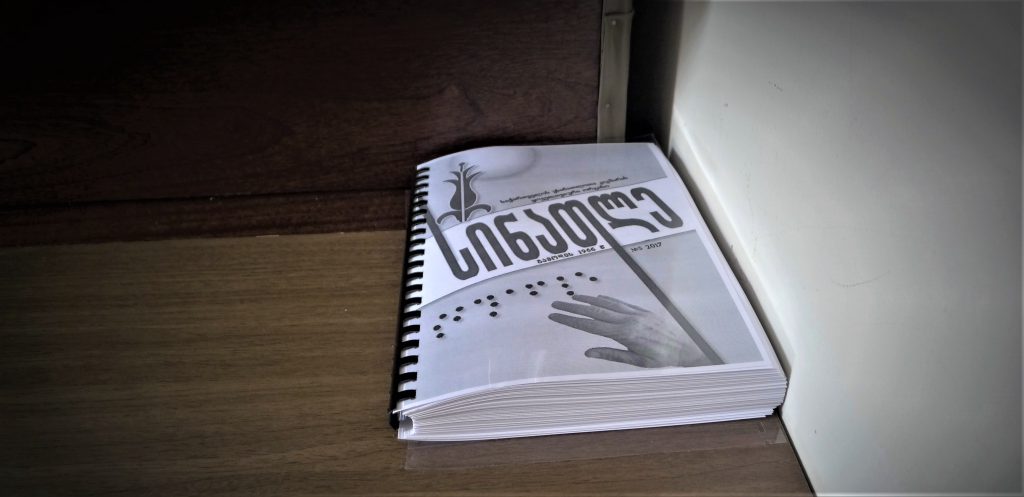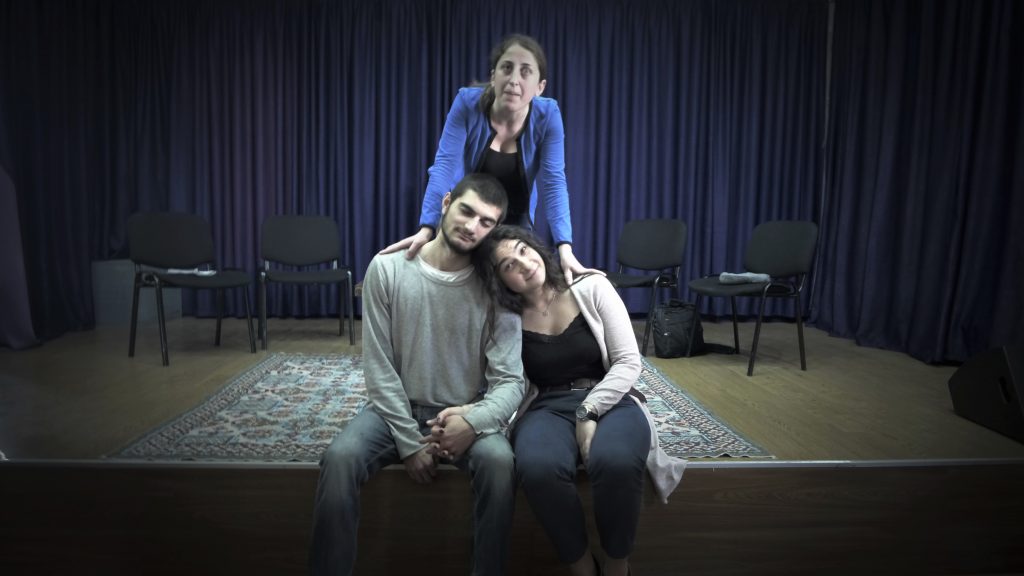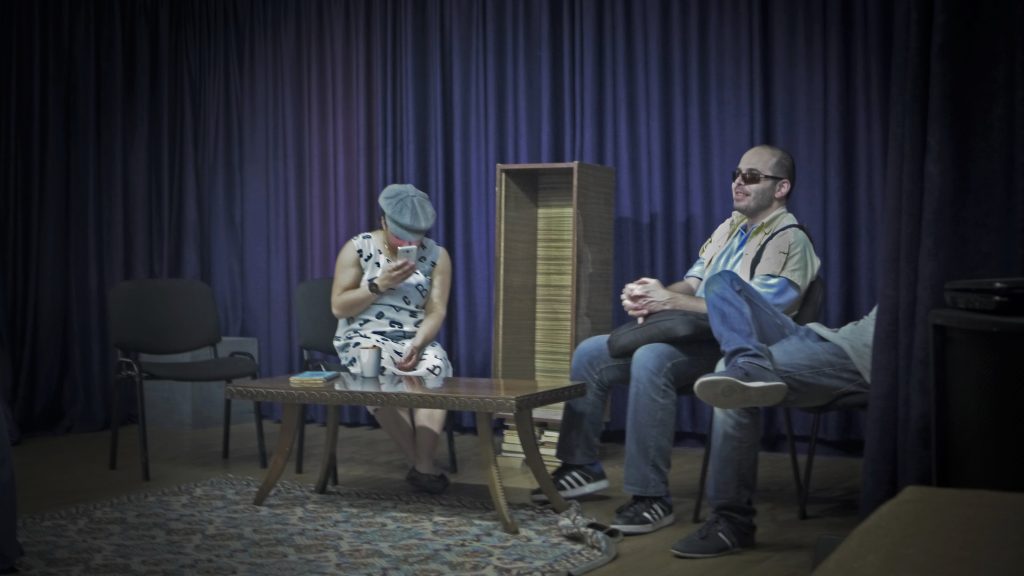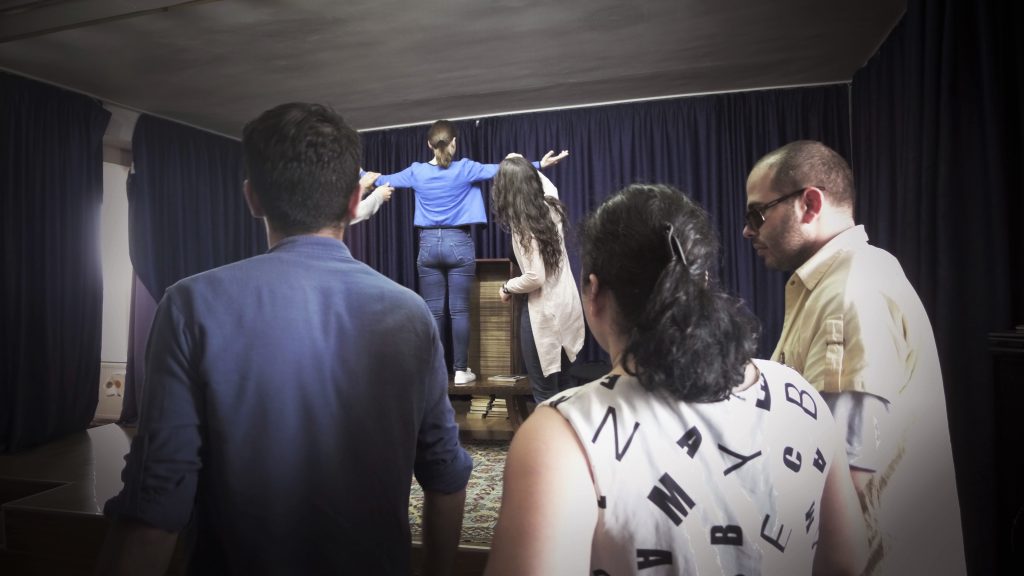

 Since the collapse of the Soviet Union, and Georgia’s economic struggles, infrastructure and support for people with visual impairments has all but evaporated. This — exacerbated by a lack of understanding — has created serious barriers in education, employment, and in life.
Since the collapse of the Soviet Union, and Georgia’s economic struggles, infrastructure and support for people with visual impairments has all but evaporated. This — exacerbated by a lack of understanding — has created serious barriers in education, employment, and in life.
She could not see the world around her
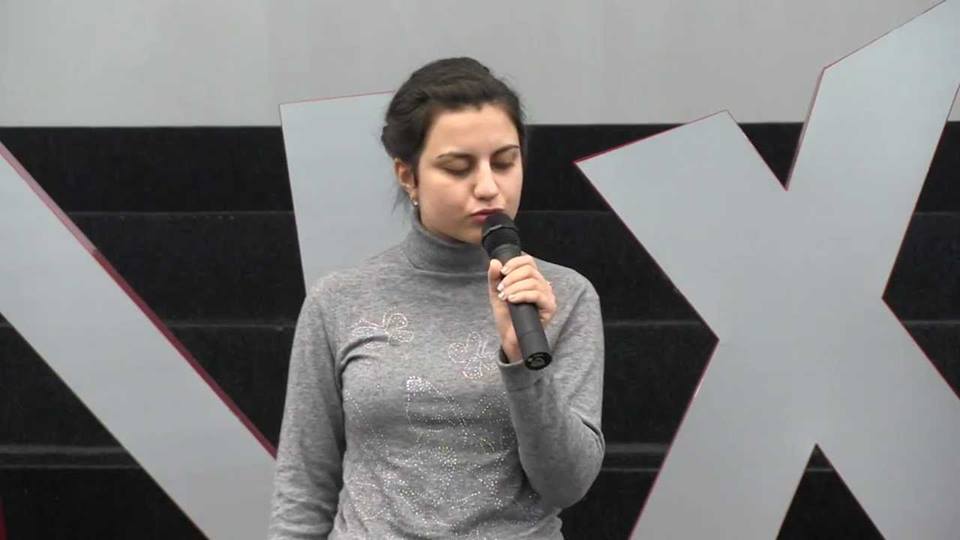
Esma Gumberidze did not learn that she was blind at any one given moment. Growing up, she certainly felt that she was different, as she was left out of the games that other children would play. She remembers complaining to her elders about having been ostracised by her peers, and how her grandmother chastised the children into playing with her. Even then she could feel that the children had been forced into playing with her, and that was perhaps even worse.
By the time she moved with her parents from their village near Kutaisi to Tbilisi, to attend the only school of it’s kind in Georgia — the Tbilisi School for Blind and Visually Impaired Children — Esma knew that she could not see the world around her.
A system that does not understand

Although officially the law guarantees children like Esma, and those with other disabilities, from access to public schools, disparate conditions and a lack of resources guarantee that their needs will not be adapted to. The only other option besides the Tbilisi School for Blind is the Boarding School for Children with Special Educational Needs, in Samtredia.
In a country such as Georgia, where many struggle with poverty, sending a child to boarding school means severing ties with them, as finances constrain their ability to see their children on a regular basis.
Esma’s first real contact with a system that did not understand her needs was with the country’s Educational Olympics. Esma fought for the competition to cater to the visually impaired, and its adaption to include braille. Even then, some of the questions entirely overlooked her needs, as they required the student to look at images. Because Esma reached the finals, she was awarded a spot in a summer programme in Tskneti. While some teachers attempted to help her, it was here that Esma first came to learn that if she did not fight for her own inclusion, the world would continue to lack understanding and respect for her and those like her.
In Soviet times
In the past, the Georgian Union for the Blind had the reach to ensure that visually impaired people living all over the country had access to programmes and institutions that would meet their needs. Today, chipped paint, rickety stairs, and old offices reflect a changing era between the Union’s start in 1926 to post-Soviet times. When it was founded under the USSR, the Union supported thousands of visually impaired people throughout Georgia. At this time, there were 26 factories in the country, and among their thousands of employees, 3,000 were visually impaired.
In the USSR, the union provided significant financial aid to visually impaired people, today they continue to provide some assistance for weddings, funerals, and in raising children, but funds have become extremely limited.
The library

Today, Ponichala, a neighbourhood on the outskirts of Tbilisi, is one of the only remnants of the communities for the visually impaired. Historically, it was one of the biggest production centres, and employed 920 visually impaired workers. Because of the number of visually impaired people living there, the Union built their Cultural Centre here.
The Centre boasted one of two cappella singing groups in the entire country, along with programmes in chess, checkers, and other sports. One of the Centre’s most valued institutions is its library, which opened in 1951. It provides books written in braille as well as audiobooks. At it’s height, the library had branches throughout the country. In 1966, the Centre also began publishing a journal on politics, society, and culture, which is still published monthly.
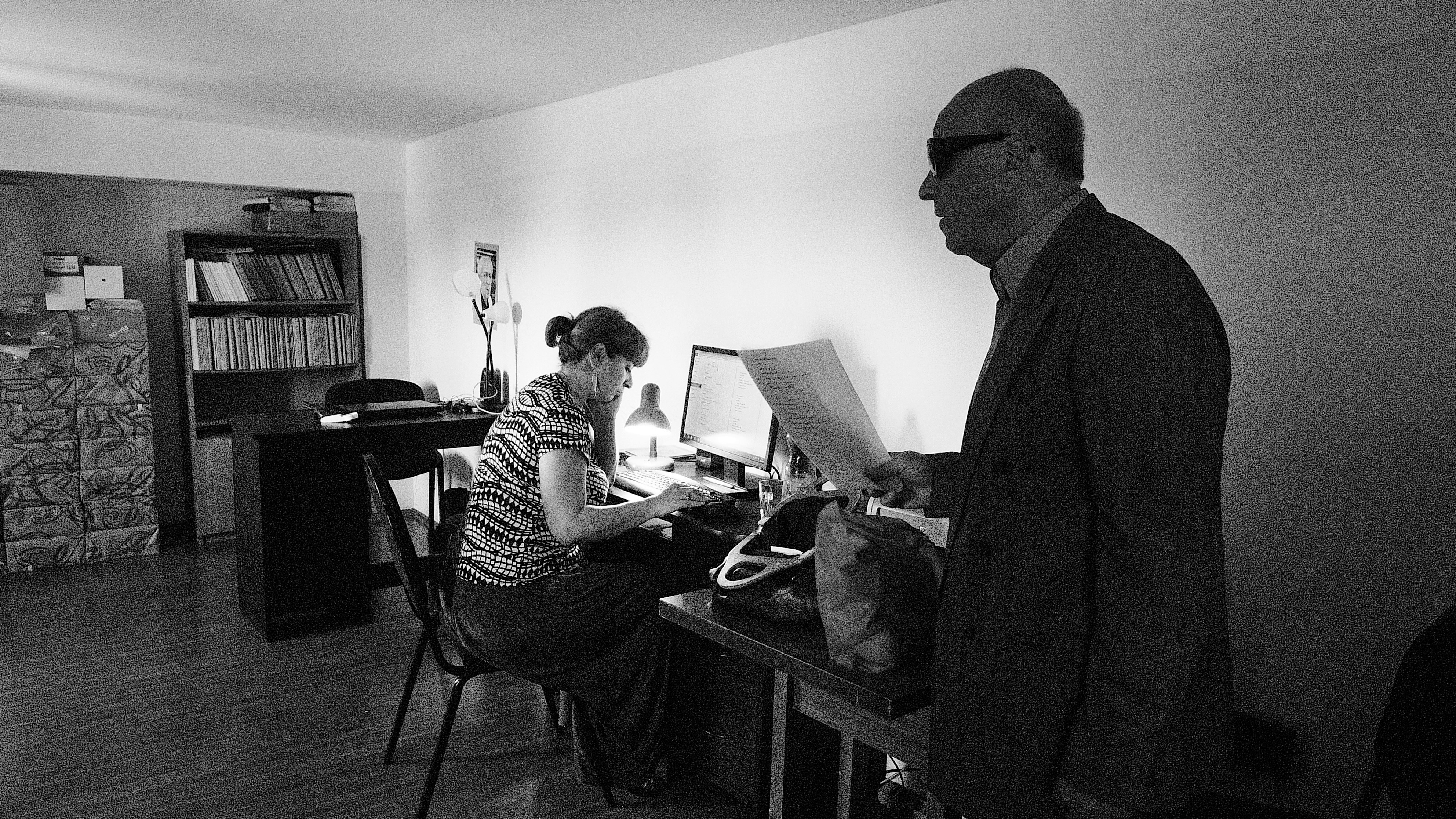
The Centre continues to host a large community of visually impaired people that can learn English, play chess and checkers, enjoy its extensive library, and participate in theater productions — it is the only remaining place for visually impaired people to do so. The current theater production includes people with different levels of visual impairment, but director Levan Khaziuri, who has been working there since February, is adamant that the differences are unnoticable.
‘At first, I was a bit unsure of how to behave so as not to cause offense to any of the people here, but today I want to thank these people for changing my viewpoint and making me value the world in an entirely different way. With this production I hope to expand the theatre programme here and to establish its reputation’, Levan told us.
No infrastructure and no work
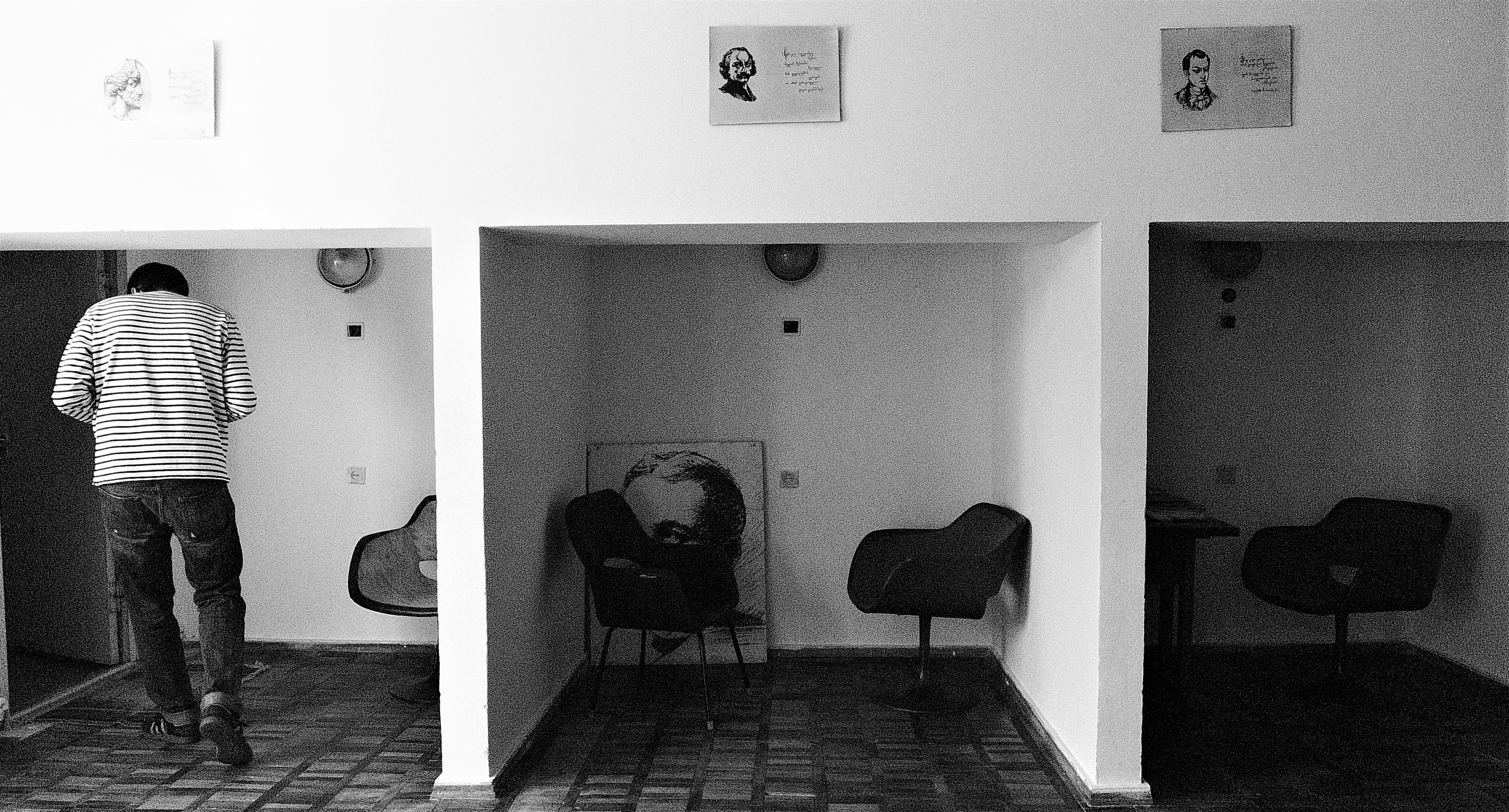
Such programmes are able to thrive partly through the financing of the Union, which continues to contribute about ₾90,000 ($37,000) annually, and partly with the help of the Tbilisi Mayor’s Office and the Ministry of Culture. Tamaz Mukeria, the Director of Business and Social Programmes for the Union, who has worked there since 1974, says that the real issue is that there is no infrastructure to support visually impaired people in the country.
Work opportunities have decreased with the country’s worsening economic situation following the collapse of the Soviet Union, and for this marginalised group of people, virtually none remain. When Esma graduated from the 12th grade, she was one of the few that had the motivation and the means to go on to university.
Excluded from education
Many of her fellow classmates and previous graduates from her school do not view university as a real possibility, because of the lack of adaptation for and recognition of their needs. Although university’s are required by law to make their facilities accessible to all students, there is a recurring disconnect between the law and reality, which continues to prevent the majority of students with disabilities from pursuing their education.
Esma first began attending the Free University of Tbilisi, who had taken visually impaired students in the past but were still unprepared to teach her. Esma had to talk to the administration herself and demand a system be set up in which someone could read her the material that wasn’t accessible in braille or audio form. Initially, she tried to establish a system in which her fellow students would read to her, as they had the same assignments, but this quickly fell apart as they were not accomplishing their job to any reasonable degree. Later, the University employed paid readers, but even this did not prove to be totally reliable.
‘Everything is dependent on an individual’s initiative’
The following year, Esma transferred to Ivane Javakhishvili’s Tbilisi State University, which guaranteed that her needs would be met. And yet, upon arriving there was no system in place to support her, and the student method failed once more. Finally, the school paid the librarians to rotate responsibility to assist her, but this was not feasible for Esma, as she began spending all of her time at the university. Esma was also the only student who took her exams using a computer, which made it impossible to maintain her anonymity while marking them.
‘Everything is dependent on an individual’s initiative to adapt the university to your own needs. And I know that I made it much better than it used to be, because I spoke to other visually impaired people who eight years ago were not even offered official readers, and were entirely dependent on their fellow students; which in my experience is not a reliable system’ Esma says.
Ineffective anti-discrimination law


Although officially Georgian law protects against discrimination of any kind, the daily reality facing those with disabilities contradicts this. Where employment is concerned, a 2015 study by Georgia’s Public Defender entitled ‘Rights of Persons with Disabilities’, found that, ‘by February 2016, 21 out of 1,689 persons with disabilities registered in the labour market management system have been actually hired’. This holds true for people with many different disabilities, including for the visually impaired, which is why they most often work in their own institutions such as the Union and the Cultural Centre.
In the city itself, adaptation for the needs of the visually impaired is virtually nonexistent, with the only auditory crosswalk next to the Cultural Centre in Ponichala. Public transport does not take the needs of the visually impaired, or even of people with other disabilities, into account.
‘Are you blind? because if you are, I can’t give you your paycheck’

What’s more, if they are able to go about their business, they are often met with discrimination on an individual basis. Tamaz Mukeria spoke about his own personal experiences when it came to retrieving his paycheck from his regular bank — the Bank of Georgia.
‘The girl at the front desk asked me, “are you blind?”, I was taken aback, but she continued, “Because if you are, I can’t give you your paycheck since you cannot read the paper and sign for it”. I was alarmed because I had been coming here for years and I had never heard of any such policy. I demanded to see documentation as proof, but of course they did not have any because such a policy would be discriminatory under Georgian law”, Tamaz said.
Ultimately, Tamaz was able to retrieve his money, after going through a month-long ordeal negotiating with the Bank’s director. He was eventually assured that the bank would be adapted to the needs of the visually impaired, but Tamaz knows that whilst the Bank of Georgia may have changed, such practices are widespread throughout the country. Without enforcement of anti-discrimination policy and an effort to change the country to meet the needs of the visually impaired, this will likely continue to be the reality.
Today, Esma is in her final year of university. She is studying in Romania on the subject of human rights — with a focus on discrimination. Esma has been able to achieve much, despite the lack of support and infrastructure available to her in Georgia, but she is an exception, not the rule.

